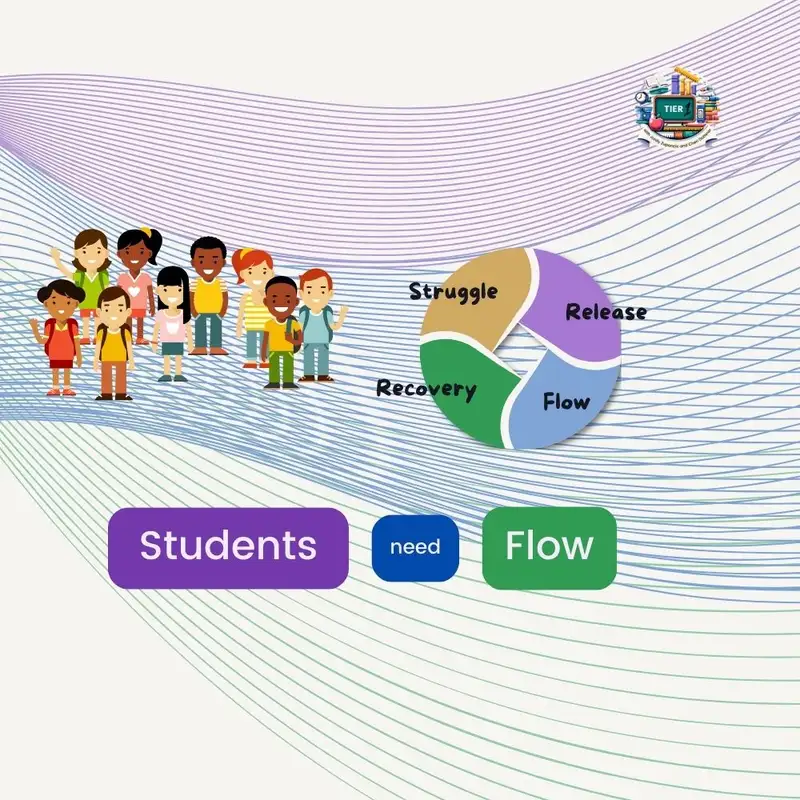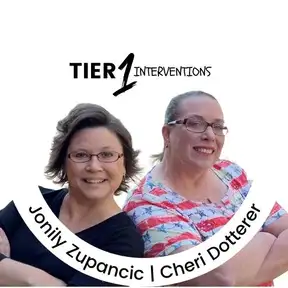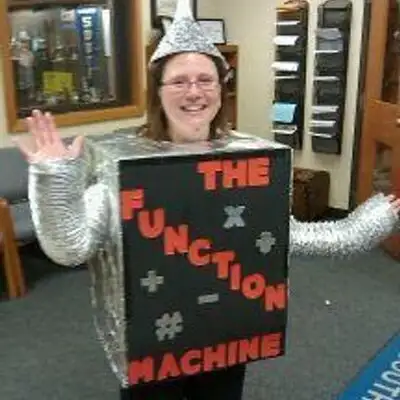
Transform your classroom in 2025: S2 E10
Cheri Dotterer 0:00
Hey everybody, it's Cheri Dotterer. You are here at tier one interventions, where we are looking at activities that you can do for the entire classroom and teach all kids at the same time, but we can also expand these activities that we're teaching two small groups and one on one sessions. So for you occupational therapists that might be listening to this podcast, you might hear a lot of math, but you're also going to hear some of the non academic connections to what is going on with math and spa Jon Mali, welcome to the podcast today.
Speaker 1 0:40
Tell us, Daisy here, Jay Z in the audience, Joni zupanzik, here,
Speaker 2 0:46
you are listening to part four of the tier one interventions workshop recorded in October. Let's pick up as Cheri talks about the concept of flow. Flow
Cheri Dotterer 0:55
was is created by me heisen chick. Me, hi. He was a good Hungarian psychiatrist who came over to the United States, and he was the father of positive psychology. He taught at the University of Pennsylvania, go Pennsylvania, he has realized that our brains cycle in have a four step cycle. Our brains need this cycle to work, to function, the first step is struggle. That's what we're doing right now. You're learning something new. You're engaged in the activity, unless you're thinking about something else that but if you are listening to your teacher, you are engaged in struggle, you are thinking, you are problem solving, you are actively listening. You're actively engaged in the conversation, especially those of you who are creating questions and responding in questions, the brain uses beta waves to to engage you in the struggle your game mind is fully engaged when we step to the second level, we have to do a release. This is why recess is so important, even in our older kin, release is so important, they need physical activity so that their brain can shift those beta waves to the alpha waves. This is where reflection and meditation and the subconscious brain starts to work. This is happening when they're outside at recess. They're making those connections to previous knowledge. They're not making it necessarily during your instruction. They're making it after that's why we want to let it linger, because that's when the brain is making those connections. Is after the fact. Then all of a sudden, your brain is going to go, Wow, that's amazing. I can't believe this goes with this, and then all of a sudden, out of their mouths are going to come this, this, this, and this because of this. And this is when Jonily always says the students can tell her what color she was wearing that day, because they have made those connections. They are totally zoned into what she is saying because they have some previous knowledge. So that second iteration of and that third iteration are the most important iterations, is when we bring it back, that second time, that third time, that fourth time, and for our kids who have disabilities, that 60th time, that 70th time, that 100th time, when they can finally make those connections that don't seem like there's connections, but they are, let's keep that thought there. Pin it. I'm going to move on to a different subject here a second. This is also when the athlete is in the zone, as they say, that person who's going to go down the slalom and go around the posts, and they do it superbly, and they get first they get they were in the zone. They were totally focused on what they had to do to accomplish the task. When the basketball player is totally on the basketball field, when the quarterback doesn't make those interceptions. And those are when they're in the zone, when the game is going the way it's supposed to. I use athletes because it was where he studied first. It's also the easiest to make the connections for our kids, that second, that third, that fourth iteration, when they can finally go, oh, it's starting to make sense now they can start to go to that second level. You guys, those of you that are in this class, we talked about paper folding. How many times so far you can now make those connections you are in the flow. You're in the zone of making the connections with paper folding, and how it relates to the non academics and the academics. Where's the next one? With flow, deep thinking, concentration, pattern recognition and rhythm occur with flow. That's when we have gamma rays and theta waves going on in our system. It depends on what we're doing, whether we're using the one or the other with recovery. This is like release, but this is what our brain is in the shutdown stage. This what I need to do when I'm watching television at night. I need to watch something that I don't have to think about in the morning, first thing in the morning, that's when I'm watching television so that I can make the connections. But at night, I'm shutting down. When we are fatigued, when we're tired, this is when recovery is essential. This is where exercise, proper nutrition, hydration, in sleep, sleep requires the delta wave, because when you are fully into a sleep cycle, you are going to have that slow rhythm. And what I want to make a point on this slide is that bottom section, that non REM sleep, that bottom row where it goes deep, you need to have 25% of your day, your night's sleep, deep REM sleep, for effective emptying of your hippocampus. I just went way off to the neural land on you, and forgive me if I if you didn't hear that before, but your hippocampus stores all the things that are in your brain for that day. Every moment of your day gets stored like an envelope, and this is where I use the analogy of a filing cabinet. The analogy is that every moment of your day gets put into a file. On the outside of the file is something, is the emotion and the feeling that go with it. It could be positive. It could be so, so it could be negative. If you don't deeply, get into deep, non REM sleep throughout your night, you did not empty that hippocampus to put it into long term memory. If you don't get that hippocampus emptied and over into long term memory, the next day, your hippocampus starts to fill up wherever it left off. Let's relate this back to our kids. When we have kids who are not paying attention throughout the day, did they sleep the night before participation in sleep is an essential part of an IEP. I know we're not talking about IEPs here, but participation in sleep is an essential part of an IEP. It's an essential part of a kid's day if we don't educate our students on the importance of getting a good night's sleep by showing them pictures like that, they're not going to understand. If we can show them why it's important, it's going to be better for them. Yes, kids in the higher level the high school, they end up getting all of these other extracurricular activities after school, but one of the things that they missed during the day is those activities that I talk about all the time, those 32nd brain interruption activities, and those brain interruption activities the inner lace by. Integration, the handstand flip on a yoga pose, mindfulness, any of those cognitive redirection and focus activities are essential for our kids to start the cycle again. And one of the things that responsive teaching does is help us start the cycle again.
Speaker 1 10:32
Holy, free, holy, I really wanted to cuss right there, but that couldn't have connected any better to our beginning of responsive teaching. And why I can't get to all of the math pieces, because the pieces that I'm talking about are the outcome and the foundation is all of this brain science that not only is the why, it's it's not that we're trying to convince you to do this. We're giving you the the reasons, the why behind the how. As I said before, the only way we're going to move the needle with student achievement, and especially math achievement, is to modify and adapt the how. And that's all on us as a teacher, whether our kids had sleep or not, or food or not, or whatever, we can only control what we can control. The only thing that we can control as an educator, as a therapist, as a parent, is our response to student perspective, and then the way that I deliver and facilitate instruction based on that response, tier one interventions. Is all about the how, but we can't talk about the how. The hell is the paper folding? The how is the reference tasks, the how is the let it linger. Ask this question, but don't answer it. There's all these nuances and subtleties that are the how, the How can't always be scripted, but some of the How can be scripted, and then you just use it over and over again. That's what we mean by plan in chunks. But the how, we can't just give you the how, because you're going to be like, Oh, that was joni's opinion. That was Cheri opinion. On there, she said, create a positive emotion experience. That was Cheri opinion, that's great, but I have all this content to teach. No, this isn't Joni and Cheri opinion. This is neuroscience. This is brain science. This is cognitive science. This is how the brain actually learns. And what we are often doing in math classrooms is we are instructing. We're doing our how, the exact opposite of the why, we're actually negating learning. Congratulations. I get snuggly about this because I'm passionate about this, because there are things that we can do, and it's on us, it's the adult. It's not on the kids. It's on us as the adults, to transcend what we're doing. I don't want you to transform what you're doing. I want you to transcend it, which means create a new path for yourself. This isn't about changing to another textbook or changing to another program, or transforming to this model or doing this new initiative. Okay, that's the pendulum swing in education. What this is, it's about transcending your instruction. And what that means is, it's all about creating a new way of being and doing. Transcendence is about going on a new path from all of the old stuff that you know work, and for all of this new learning on the why and the how, and then creating a new instructional facilitation pattern that has never been done before. This is not about the pendulum swing. This is about get up the Swing and move forward. Hallelujah. Sorry, okay, and it's also
Cheri Dotterer 14:39
get on the swing and go backwards, lean balance and get the swing going a little bit more together. Theresa talked earlier about this child that would not go backwards on the swing we create. To swing the pendulum. But if we are not engaging those sensory responses, the proprioception, the vestibular and the interoception, you're not going to create the novelty that is going to create the education. But you what
Unknown Speaker 15:25
was your key takeaway? Amy
Speaker 1 15:30
dolly talks about like the core memory I ended up getting. I connected it to the inside out with the core memory ball. I bought a little light up for memory ball on Amazon, and we'll light it up. And then I we've been making circles. So instead of posting where I used to post my reference tasks, had to go to something else. We put our visual schedule there, so all the kiddos that need to see that can see it. So we've made memory balls up on one wall with the reference task, but then we connected it to other things too that we're working on in reading and writing and whatever.
Cheri Dotterer 16:08
Everything. Of course, everything's new to me being the OT, but I keep thinking more and more, how can I bring this back to my school, and how can I feel like I'm the lowly OT? How can I make I'm not a math person, but
Speaker 1 16:21
how can I make this work in my building? Math person? Now we have 10 certified coaches in the achievement formula. Amy and Natalie are both certified coaches, but they know math. I don't know I don't even have math lingo, but it's good. I don't want you to know math, because the people that know math ruin math when they teach it. You're actually, if you became trained as an achievement formula certified coach, you would only know the math that I teach you, and that is the best way to know math. Yeah, I
Cheri Dotterer 16:52
can play ignorant and just say, hey, but it's Yeah, I feel there's such a just by being with you, there's such an ignorance of a lack of no in ignorance out there of what should be done. And I see it coming from the littles up to the what's lacking. And I know that Cheri sees it in the fact of the kids, not if my kids learn the alphabet sooner, I
Teresa 17:14
wouldn't be struggling with them in the older grades, I give my kids an alphabet sheet, and they're still looking at me like in second and third grade, what letter Do you want?
Cheri Dotterer 17:22
I did tails tail letters this week. And
Speaker 1 17:25
they're like, huh, where do they live? And I'm like, oh my god, I just want to shake them. People. Know what I I don't mean to be so snarky because I'm like, teachers, teachers, we are working our tails off. Okay, yeah, we're like, we're flipping working so hard to the point that we can't add another thing as a teacher. And so I get on teachers, and I'm a coach for teachers, and you hear me say these things, and you hear me be snarky, but I know you as a teacher, you are doing everything you can that you believe is the best. The problem is you're working so hard on things that are not making an impact, right because of the way you're doing it. I'm not blaming you because you don't know what you don't know, but I am blaming you if you come to these things and you don't make changes. You guys have a great
Cheri Dotterer 18:29
you guys have a great month, and look forward to seeing you at Saturday mass and impact Wednesday before next month to later.
Unknown Speaker 18:37
Hi guys. You.
Transcribed by https://otter.ai
Episode Video
Creators and Guests


